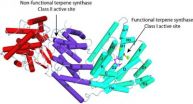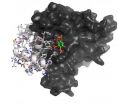(Press-News.org) Montreal, January 10, 2012 — Adults from 30 to 60 years old, especially those from lower socioeconomic backgrounds, aren't consuming the daily recommended levels of fruits and vegetables. Quebecers, however, eat more of nature's produce than their fellow Canadians.
These are some of the findings of a new Concordia University study, published by Nutrition Journal, which sheds light on who reaches in their fridge crisper often enough to gain the health benefits of a balanced diet comprised of fruits and vegetables.
"People from the Atlantic to the western provinces consume fruits and vegetables less frequently compared to Quebecers," says lead author Mesbah Sharaf, a PhD candidate in Concordia's Department of Economics. "This could be due to cultural influence, since Quebec is a predominantly a French-speaking province with a long history of farming, fruits, vegetables and dairy products."
Co-author Sunday Azagba, who is also a PhD candidate in the Concordia Department of Economics, says: "This study furthers our understanding of how finances or lifestyle influence fruit and vegetable consumption to eventually target groups to promote better nutrition policies."
The researchers analyzed data collected from almost 94,000 people, aged 18 to 69 years, from the Canadian Community Health Survey. They looked at factors such as gender, education, income, marital and smoking status to reveal differences in how often people of various backgrounds consume fruits and vegetables.
The analyses revealed that people with low education and low income ate fruits and vegetables less frequently — about 4.5 times per day. Individuals with higher education and income, for their part, ate nature's produce a little over five times per day.
"There are also significant disparities in the frequency of fruit and vegetable consumption by demographics and lifestyle," Azagba says.
Men, singles, smokers, people in their 40s and households with no children, for example, reached for the fruit bowl less often. The research team also found that:
Quebecers went to the crisper more often than their counterparts in any other province. (The territories were not included).
Women tended to munch on fruit and vegetables more frequently (5.4 times a day) than men (4.5 times).
Those who have a weak social network didn't have as much appetite for fruit and vegetables as those who have strong networks of friends.
People with a higher level of education ate carrots and apples more frequently — regardless of other demographic and lifestyle factors.
Getting the message out
Eating a daily minimum of five servings of fruits and vegetables is proven to have a slew of health benefits. According to the World Health Organization and the Food and Agricultural Organization, an adequate intake of farm produce reduces the risks of diabetes, strokes, obesity and high blood pressure.
Despite this evidence, the study authors found fruit and vegetable consumption for most people is below the daily recommended value. They suggest that people may be encouraged to eat more broccoli and berries by raising their awareness of the health benefits through media and community-based nutrition programs, as well as through government subsidies of such produce.
"There is no one-size-fits-all strategy to promote healthy eating behaviour; a multifaceted approach would be required to successfully address the low consumption of fruit and vegetables, especially among people from low socioeconomic backgrounds," says Sharaf.
INFORMATION:
Related links:
Cited study www.nutritionj.com/content/10/1/118
Concordia Department of Economics http://economics.concordia.ca/
World Health Organization (nutrition) www.who.int/topics/nutrition/en/
Media contact:
Nadia Kherif
Media Relations Advisor
Concordia University
Tel.: 514 848-2424, poste 4187
Cell : 514 262-0909
email : nadia.kherif@concordia.ca
twitter.com/MediaNad
concordia.ca/now
END
CORVALLIS, Ore. – New research at Oregon State University provides evidence for the first time that disruption of circadian rhythms – the biological "clocks" found in many animals – can clearly cause accelerated neurodegeneration, loss of motor function and premature death.
The study was published in Neurobiology of Disease and done by researchers at OSU and Oregon Health and Science University. Prior to this, it wasn't clear which came first - whether the disruption of biological clock mechanisms was the cause or the result of neurodegeneration.
"In these experiments, ...
The recent discovery that bisabolane, a member of the terpene class of chemical compounds used in fragrances and flavorings, holds high promise as a biosynthetic alternative to D2 diesel fuel has generated keen interest in the green energy community and the trucking industry. Now a second team of researchers with the U.S Department of Energy (DOE)'s Joint BioEnergy Institute (JBEI) has determined the three-dimensional crystal structure of a protein that is key to boosting the microbial-based production of bisabolane as an advanced biofuel.
The JBEI research team, led ...
An Emory University study published in the January issue of Health Affairs assesses real-world lifestyle interventions to help delay or prevent the costly chronic disease that affects nearly 26 million Americans.
Researchers from Emory's Rollins School of Public Health (RSPH) systematically reviewed the published literature and analyzed 28 studies that tested adaptations of the Diabetes Prevention Program (DPP) trial in real-world settings. Published in 2002, this major clinical trial showed that structured lifestyle programs for people with prediabetes could halve the ...
CHICAGO (January 10, 2012) – According to the results of a new study published in the January 2012 issue of the Journal of the American College of Surgeons, many early-stage breast cancer survivors lacked knowledge about their disease and were not meaningfully involved in treatment discussions or asked their preferences regarding the approach to treatment. As a result, the study's investigators determined that there is a need for improvements in the quality of the surgical decision-making process for these patients.
The retrospective study sought to evaluate the quality ...
Scientists at the University of Leicester have opened up a whole new approach to the therapeutic intervention for a family of anti-cancer drug targets, thanks to a completely new and unexpected finding.
Professor Schwabe and his colleagues, Drs Watson, Fairall and Santos, have published their research this week in leading science magazine Nature detailing a new understanding of how transcriptional repression complexes work. Their work, which is based around determining atomic resolution structures of medically important bio-molecular complexes, has been ongoing for six ...
Climate change in the form of reduced snowfall in mountains is causing powerful and cascading shifts in mountainous plant and bird communities through the increased ability of elk to stay at high elevations over winter and consume plants, according to a groundbreaking study in Nature Climate Change.
The U.S. Geological Survey and University of Montana study not only showed that the abundance of deciduous trees and their associated songbirds in mountainous Arizona have declined over the last 22 years as snowpack has declined, but it also experimentally demonstrated that ...
An extremely hot, massive young galaxy cluster — the largest ever seen in the distant Universe — has been studied by an international team using ESO's Very Large Telescope (VLT) in the Atacama Desert in Chile along with NASA's Chandra X-ray Observatory and the Atacama Cosmology Telescope. The new results are being announced on 10 January 2012 at the 219th meeting of the American Astronomical Society in Austin, Texas.
The newly discovered galaxy cluster [1] has been nicknamed El Gordo — the "big" or "fat one" in Spanish. It consists of two separate galaxy subclusters colliding ...
Over the holidays Long Island Exchange Columnist Cognac Wellerlane attended a holiday celebration at the House of Savoia. The event was hosted by suit and costume designer Michelle Savoia and Vanity Fair editor George Wayne. It was held on Essex Street in the lower east side of Manhattan.
The House of Savoia is known for its custom suits and men's apparel and Savoia is famous for designing costumes for Broadway shows. The event was sponsored by Van Gogh Vodka, and cocktail courtesy by Molinari. Among those who attended were a variety of celebrities, such as models, actors, ...
HCMWorks announced today the naming of Ted Weyn to the Sourcing Interests Group's Advisory Board.
Sourcing Interests Group (SIG), www.sig.org, is a membership organization comprised of sourcing and outsourcing professionals from Fortune 500 and Global 1000 companies, as well as the service providers and advisory firms that serve them. Members of all types are focused on advancing the sourcing/procurement and outsourcing industries by sharing best practices and thought leadership in a strictly-enforced non-commercial environment.
SIG is acknowledged globally for its ...
New findings by St. Michael's researchers about the way cells work could lead to a test and therapy for kidney failure caused by E. coli
TORONTO, Ont., Jan. 10, 2012—Ever since the water supply in Walkerton, Ont., was contaminated by E. coli in 2000, Dr. Philip Marsden has been trying to figure out just how a toxin released by that particular strain of the bacteria causes kidney damage in children.
Now Dr. Marsden and his team based at St. Michael's Hospital and the University of Toronto, led by graduate student Tania Petruzziello-Pellegrini, together with an international ...



